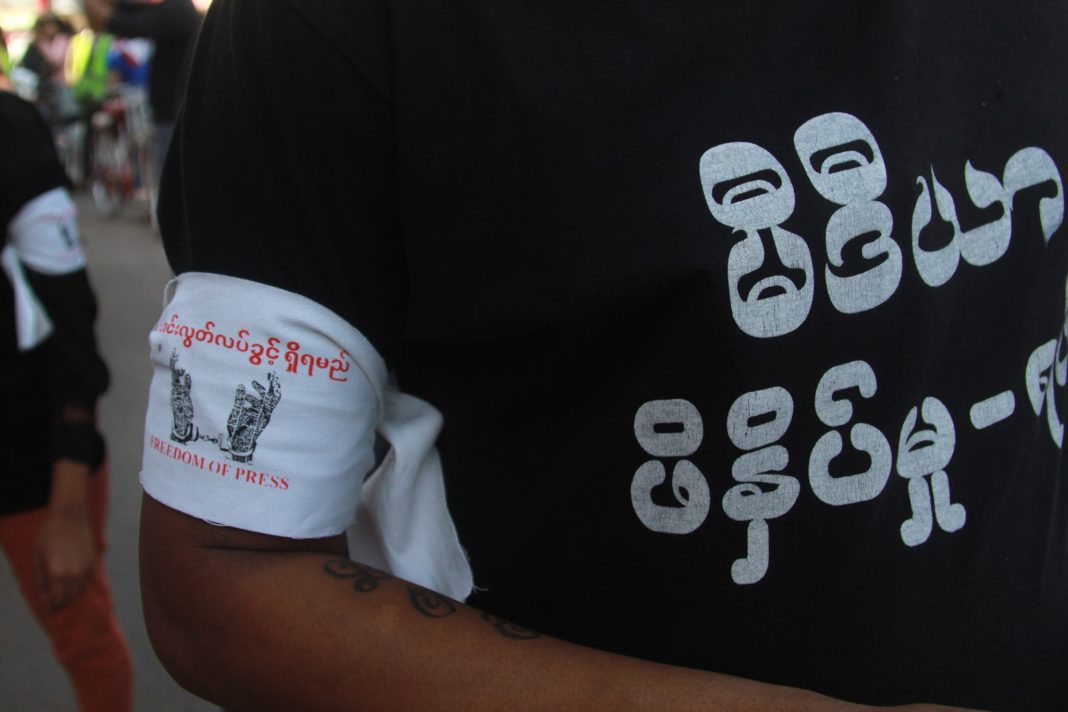SHAN spoke with Nan Pawt Gay, chair of the policy board of ethnic media network Burma News International (BNI) Multimedia Group, in honor of World Press Freedom Day earlier this month and to highlight the increased crackdown on journalists in Burma.

What is the current state of media freedom in Burma?
There are many challenges for media outlets in central Burma and ethnic media outlets in ethnic states in these days. I think government has put more restrictions on media.
What are the challenges?
The international community already knows about it. Journalists have been arrested in 2020 as they were pursuing news. Even though the authorities knew these people were journalists, they arrested and tortured them. We have evidence. The authorities arrested journalists in February and March for the reason that they communicated with as a news source a person from an ‘unlawful association,’ which was declared as such by the government. These journalists are charged with violating the Counterterrorism Law. I think they are trying to ensure that these journalists won’t continue to work as journalists in the future. They have many reasons for their arrest of journalists. Therefore, we have more challenges now than in previous years.
Can you tell us the difference between the media in central Burma and ethnic media in ethnic regions?
From perspective of media freedom, neither media in central Burma nor ethnic media in ethnic regions have media freedom. We are the same in losing media freedom. Media in central Burma means media outlets based in big cities. Big media groups have many reporters, so they can exchange information. They are quick to get news and report news stories. For ethnic media outlets, we have a fewer reporter. They are also based in different areas and different regions. For example, there may be only one reporter in a certain ethnic area. Sometimes we are so worried about our reporters when they go to get information for the news. There are many challenges for ethnic journalists. We also have challenges in balanced news reporting. When we report balanced news, sometimes we can be charged under the existing laws. If we are prosecuted, there are no legal aid organizations to support ethnic media outlets. This will be the main difference between ethnic media outlets and media outlets in central Burma. We have differences in getting news, reporting news, and the consequences of publishing the news.
To have genuine freedom of the press, what should the government and the people do?
People need to understand the important role of news media. The government also needs to understand what news media’s role is and how it can work together with media during a democratic transition. If the government cannot directly support media, the government should indirectly support media such as by understanding its role. I think that the government is only working for the development of its information ministry. The government should have a mechanism to support ethnic media and ethnic reporters freely reporting the news. There is no mechanism in government to support ethnic media. At the same time, the current government is implementing the peace process in the country. If the government tries to push media into a narrow corner, it will impact the peace process. It will also impact the building of a federal Union. Therefore, the country’ is still far away from its goal.
What is your analysis of media’s role amid all of the current challenges?
The COVID-19 pandemic has affected the world. Reporters have many challenges in reporting the situation of people living in different regions and the situation of trying to control the pandemic. It is difficult for reporters to get news and conduct real-time news reporting amid the COVID-19 pandemic. Even though we have many challenges, our job is to report the news. So we have to find a way to get the news and to report it. Nobody is helping us. We have to manage by ourselves to get the news and continue to report it amid the COVID-19 pandemic.
Editor’s Note: SHAN is a member of BNI.












Leave a Comments